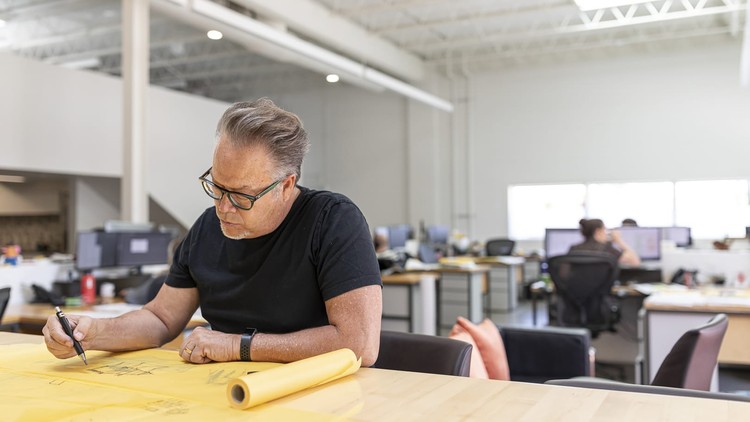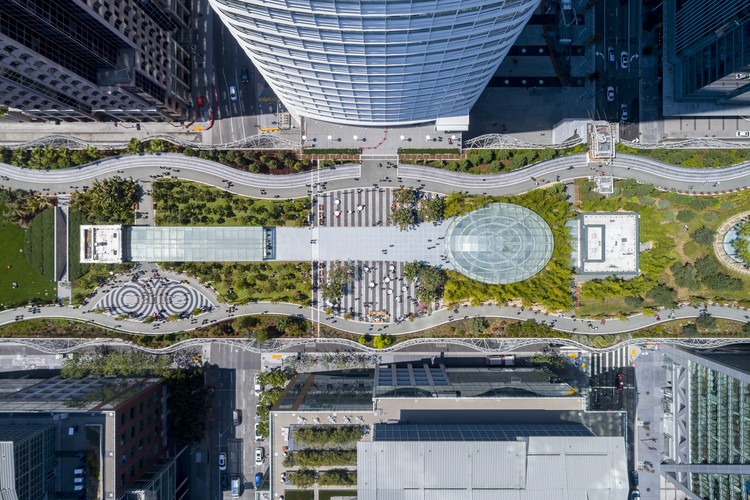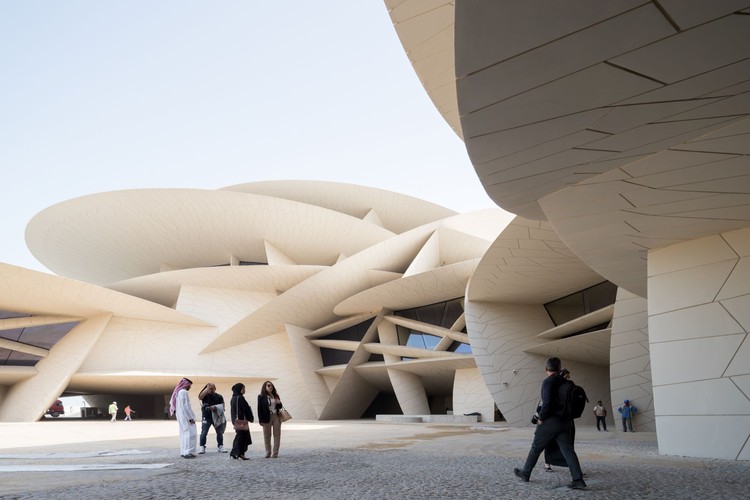
Creating a model for rendering does have its own set of rules. To get you up and rendering as quickly as possible, here are SketchUp's top five tips for prepping your SketchUp model for rendering.


Creating a model for rendering does have its own set of rules. To get you up and rendering as quickly as possible, here are SketchUp's top five tips for prepping your SketchUp model for rendering.

Oscar Ribeiro de Almeida Niemeyer Soares Filho, or simply Oscar Niemeyer, (December 15, 1907 – December 5, 2012) was one of the greatest architects in Brazil's history, and one of the greats of the global modernist movement. After his death in 2012, Niemeyer left the world more than five hundred works scattered throughout the Americas, Africa, and Europe.

Australia’s most iconic landmarks have had their facade peeled off to reveal their interior, in order to make these spaces more recognizable to the general public and cater to the curiosity of people.
.jpg?1576062728)
What happens when the sensor-imbued city acquires the ability to see – almost as if it had eyes? Ahead of the 2019 Shenzhen Biennale of Urbanism\Architecture (UABB), titled "Urban Interactions," Archdaily is working with the curators of the "Eyes of the City" section at the Biennial to stimulate a discussion on how new technologies – and Artificial Intelligence in particular – might impact architecture and urban life. Here you can read the “Eyes of the City” curatorial statement by Carlo Ratti, the Politecnico di Torino and SCUT.
Cities, as Goethe had already pointed out, should be understood as continuously developing 'forms in motion' (see Batty 2018). In the past, technological developments and our hopeful, as well as our dystopian imaginations of them, have been one of the main sources of kinetic energy to kick-off the shapeshifting processes of urban transformations. Most of the time with unexpected side-effects, evolving center stage in retrospect.

Frederico Babina is an Italian architect and graphic designer who creates artwork that focuses on the abstract replications of famous imagery and buildings. Through a strong focus on geometry and form his work represents a sense of innocence, inexperience and spontaneity throughout.

This article was originally published on Common Edge.
Conversations around resiliency today seem to imply that planners and designers might be capable of—might even be expected to—save every building and public space at risk. The sad truth is, however, that we cannot, and perhaps we should not. Climate change and its attendant sea level rise will radically redraw urban edges, forcing us to make difficult decisions. Even if we had the vast sums of money required to protect the precarious status quo, that might not be enough to stave off the inevitable.
So, then: What are our priorities? How do we choose what to save? How do we responsibly chart this uncertain future? I believe the answers to these and similar questions should begin with an honest assessment of three essential considerations:

Designed by Arquitectonica, Miami’s most anticipated landmark dubbed Elysee has topped-off construction at 57 stories. Upon its completion in 2020, the 649-foot-tall glass tower will become the tallest residential building in the Edgewater district.

Two Trees Management Company, a New York-based real estate development firm, has presented a master plan for the Northern Brooklyn waterfront, a new approach to urban resiliency. Designed by BIG and Field Operations, the project puts in place a mixed-use development and a resilient park.

The new museum by BIG for Swiss luxury watchmaker Audemars Piguet is set to open to the public next May. As featured in WSJ. Magazine, the project was designed as an extension to their headquarters in Le Brassus, near Le Chenit. Conceived as a spiraling glass pavilion in the landscape, the design will take visitors on a narrative journey through the company's 139-year history.
.jpg?1576108217)
Weiss/Manfredi have been selected to lead the new La Brea Tar Pits master planning in Los Angeles. The team's ‘Loops and Lenses’ concept was developed to create new connections between "the museum and the Park, between science and culture, and envisions the entire site as an unfolding place of discovery." The team will work with NHMLAC on a multi-year process of public engagement, master planning, design and construction on the Tar Pits’ 13-acre campus.
ArchinfoFinland.jpg?1576139638)
Archinfo Finland has announced the theme and curatorial team for the Pavilion of Finland at the 17th International Architecture Exhibition of the 2020 Venice Biennale. Entitled New Standards, the exhibition conceived by Laura Berger, Philip Tidwell, and Kristo Vesikansa will explore Finland’s timber industry.

The Board of Directors and the Strategic Council of the American Institute of Architects (AIA) have awarded renowned architect Marlon Blackwell, FAIA, with the 2020 Gold Medal. This prize credits an individual that had a lasting influence on the theory and practice of architecture.

This year showcased how landscape architecture is shaping public life in the built environment. In the first two decades of the 21st century, landscape architects created vibrant resiliency plans, rehabilitation projects, and new urban parks. As these twenty years come to a close, 2019 embodied many larger ideas and trends that will continue to influence the next decade of landscape design.
_0230.jpg?1575597078)
Open More Doors is a section by ArchDaily and the MINI Clubman that takes you behind the scenes of the world’s most innovative offices through exciting video interviews and an exclusive photo gallery featuring each studio’s workspace.
.jpg?1576051979)
Sky Green, WOHA’s first project in Taichung, Taiwan has just been completed. Commissioned by the developer Golden Jade, with Feng Chia University as an advisor, the project is the first green and sustainable mixed-use development in the city.

MVRDV has won the competition to redesign the Tancheon Valley and Seoul’s waterfront. Called “The Weaves”, the design was made to knit together pedestrian and bicycle paths, the natural landscapes, and public amenities. Commissioned by the government of Seoul, the design introduces a combination of natural and human activity in the midst of the city.

Use the term ‘volume builder’ in front of an architect, and there’s a fair chance they’ll shudder. Conjuring a vision of homogenous, mass-produced boxes squished together, ruining the look of leafy suburbs traditionally populated by impeccably designed homes, volume building is often seen as the poor cousin.
However, not all volume builders are cut from the same cloth.

More than 5.000 architecture projects were published in ArchDaily this year. Year after year, we curate hundreds of residential projects, and as we know our readers love houses, we compiled a selection of the most visited residential projects published on the site.
Set in various locations around the world, in urban, rural, mountain and beach landscapes; a variety of structural designs, from traditional masonry to the most technological prefabricated systems; from small dwellings to large houses and materials such as concrete, wood, and bricks as the most used. We also found their design and typology solutions were very much aligned with their specific settings and all of them share a strong dialogue between the house and nature, whether it is its direct surroundings or the introduction of green into a more condensed urban setting.
This selection of 50 houses highlights the most visited examples during these twelve months and, according to our readers, were the most attractive in innovation, construction techniques, and design challenges. Check them out below:

Qatar has been radically reshaped by growth and development. The sovereign state transformed since the second half of the twentieth century after the discovery of the Dukhan oil field in 1940. Capitalizing on over 70 years of economic development, Qatar now has the highest per capita income in the world. Reflecting the country’s wealth, its modern architectural projects are being built at a monumental scale.

Sasaki has been selected by the government of Ho Chi Minh City to conceive the innovation district in the eastern part of the city, in collaboration with enCity, an international planning practice based in Singapore and Vietnam.
.jpg?1575887324)
The Royal Institute of British Architects has released the names of the 2019 winners of the President’s Medals, the annual awards for the world’s best student architecture projects. To showcase these achievements, an exhibition will be held in London, from the 4th of December 2019 till the 1st of February 2020, before touring throughout the UK and internationally.

Relatively unknown outside his home country, Clorindo Testa (December 10, 1923 – April 11, 2013) was one of Argentina’s most important 20th-century architects. Consistently defying categorization, Testa had a hand in two of Buenos Aires’ most iconic buildings, the Bank of London and South America, and the National Library, as well as many others throughout his long career. Characteristically enigmatic, Testa would only ever acknowledge Le Corbusier as an influence, saying, “I never paid attention to other architects.” As a former colleague Juan Fontana described, Testa spoke the language of brutalism with an Argentine accent.